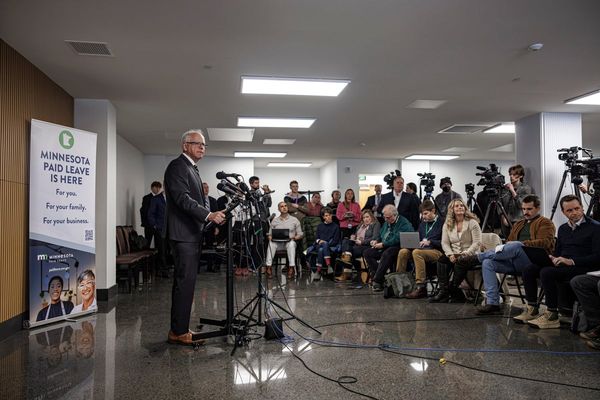
As state visits go, Vladimir Putin’s arrival in North Korea on Wednesday was relatively low-key. There was no long line of senior government officials on the airport tarmac in Pyongyang and only a small guard of honour. Beneath an ink-black sky, the Russian president stepped off the plane to be greeted by a handshake and a hug from Kim Jong-un, before being presented with a bouquet by a woman in traditional hanbok dress. But the modesty of the occasion was deceptive.
Putin arrived in the North Korean capital from Moscow, via the Russian far east, in darkness, the leaders’ motorcade making its way through “charmingly lit” streets to the Kumsusan state guesthouse in the early hours of Wednesday.
Despite – or perhaps because of – the unsociable hour, the two men reportedly shared their “pent-up, inmost thoughts,” according to the state-run Korean Central News Agency, but the world would have to wait for how those frustrations would feature in their two-pronged challenge to what Putin reportedly called during his visit the “hegemony and imperialism” of the west.
The inclusion of a mutual aid clause in their agreement – requiring one country to offer assistance if the other is attacked – was a sign of how far Russia-North Korea ties have come since Putin’s first visit to Pyongyang, 24 years ago.
But the leaders’ “comprehensive strategic partnership”, agreed shortly before Putin left for a two-day visit to Vietnam, was an incomplete account of the summit. And for good reason: why add flesh to the bones of agreements that, in whole or in part, are likely to violate international sanctions against both regimes?
In a repeat of their previous meeting in Vladivostok nine months ago, neither leader was expected to reveal what, if any, agreements had been reached on weaponry for the war in Ukraine in return for technological knowhow or food and energy aid for North Korea.
There was nothing cryptic, though, about the mood music behind the agreement: that this was a meeting of minds built on a mutual necessity so urgent that their nemeses in Washington, Seoul and Tokyo appear powerless to apply the brakes.
When Putin was last in North Korea, his host, Kim Jong-il, was still several years away from overseeing a nuclear test that would for ever change the world’s calculations when it came to the country. When Putin met G8 leaders months later at a summit in Japan, he told Tony Blair, Bill Clinton and others that Kim appeared to be a man with whom they “could do business”.
Almost a quarter of a century on, much of the business being conducted with Pyongyang is clandestine and confined to a small group of allies led by China and Russia. The G8 became the G7 after Russia’s 2014 annexation of Crimea. Kim Jong-il died more than a decade ago, his youngest – and reportedly most capricious – son now at the helm of a state on the brink of becoming a genuine nuclear power.
Just as 17 years of UN sanctions have failed to derail the younger Kim’s quest for a nuclear-backed guarantee against aggression by a “hostile” US, the condemnation that prefaced this week’s Pyongyang summit is unlikely to derail the Kim-Putin axis.
Their interests have aligned at a dangerous moment – in Europe, where war continues to rage in Ukraine, and in north-east Asia, where Washington and its allies must contend with a nuclear-armed North Korea and Beijing’s intentions towards Taiwan and the South China Sea. But the long-term consequences of their partnership for the rest of the world remain unclear.
The full VIP treatment arrived with daylight in Pyongyang, including a lavish ceremony in Kim Il-sung Square attended by soldiers, an orchestra and balloon-waving children. It ended with the two leaders being driven to the venue for their talks in an open-top car, their enormous portraits staring down beneath a bright blue sky. Later, they were expected to attend a gala concert and a state reception, and lay wreaths at a monument dedicated to the Soviet troops who helped liberate Korea during the second world war.
How effective that show of hospitality proves for Putin’s host remains to be seen. Much will depend on whether Russia agrees to share sensitive military technology with North Korea – something Putin did not rule out – in return for continued material support for Russian troops in Ukraine. Putin could reciprocate with food and energy assistance, as well as help with North Korea’s space surveillance programme.
More worrying would be any indication the two states could rekindle their Soviet-era relationship with a Nato-style military alliance that compels Moscow and Pyongyang to come to each other’s defence in the event of a conflict. As Putin prepared to leave for Vietnam, it was not clear if the vow of mutual aid if either was attacked would extend to military assistance.
“The answer to that question turns on whether the Russia-North Korea relationship is only a temporary marriage of convenience – or indicative of a deeper, more long-term alliance, akin to the relationship between the two countries during the cold war,” Sue Mi Terry, a senior fellow for Korea studies at the Council on Foreign Relations, wrote on the eve of the talks.
If that latter proves to be the case, the repercussions will be felt well beyond Ukraine and the Korean peninsula.







